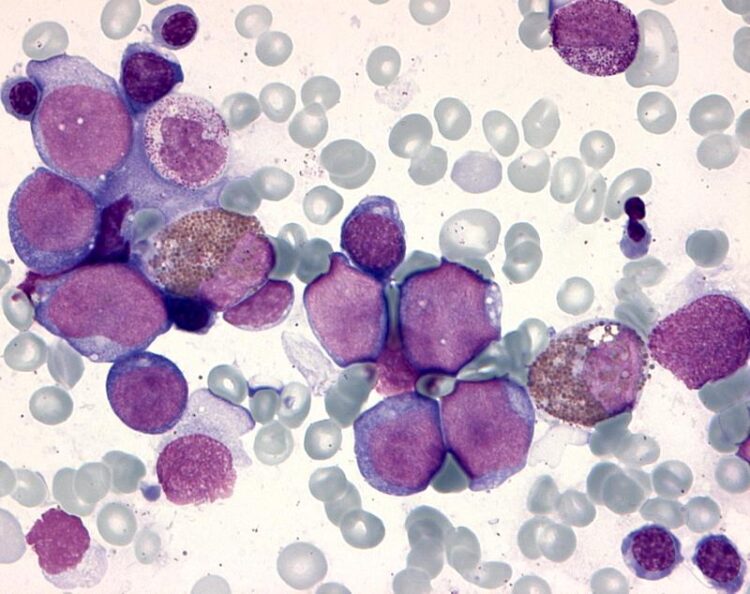Cause of leukaemia in trisomy 21

Bone marrow smear from a child with Down syndrome who suffers from leukemia. The purple-coloured leukemic blasts displace normal blood formation.
(c) Jan Klusmann / University Hospital Frankfurt
People with a third copy of chromosome 21, known as trisomy 21, are at high risk of developing Acute Myeloid Leukaemia (AML), an aggressive form of blood cancer.
Scientists led by the Department of Paediatrics at University Hospital Frankfurt have now identified the cause: although the additional chromosome 21 leads to increased gene dosage of many genes, it is above all the perturbation of the RUNX1 gene – a gene that regulates many other genes – that seems to be responsible for AML pathogenesis. Targeting the perturbed regulator could pave the way for new therapies.
Leukaemia (blood cancer) is a group of malignant and aggressive diseases of the blood-forming cells in the bone marrow. Very intensive chemotherapy and in some cases a bone marrow transplant are the only cure. Like all cancers, leukaemia is caused by changes in the DNA, the heredity material present in human cells in the form of 46 chromosomes. In many forms of leukaemia, large parts of these chromosomes are altered. People with Down syndrome, who have three copies of chromosome 21 (trisomy 21) are highly vulnerable: the risk of developing aggressive Acute Myeloid Leukaemia (AML) in the first four years of their life is more than 100 times greater for children with Down syndrome. Down syndrome is the most common congenital genetic disorder, affecting about one in 700 newborn babies.
RUNX1 transcription factor is responsible

(c) Klaus Waeldele / University Hospital Frankfurt
The research group led by Professor Jan-Henning Klusmann, Director of the Department of Paediatric and Adolescent Medicine at University Hospital Frankfurt, has now discovered how the additional chromosome 21 can promote AML. With the help of genetic scissors (CRISPR-Cas9), they examined each of the 218 genes on chromosome 21 for its carcinogenic effect. It emerged that the RUNX1 gene is responsible for the chromosome’s specific carcinogenic properties. In further analyses, the researchers were able to corroborate that only one particular variant – or isoform – of the gene promotes the development of leukaemia. Klusmann explains: “Other RUNX1 isoforms were even able to prevent the cells from degenerating. This explains why RUNX1 has so far not stood out – in several decades of extensive cancer research.”
The RUNX1 gene encodes a “transcription factor” – a protein responsible for regulating the activity of other genes. RUNX1 regulates many processes, including embryonic development and early and late haematopoiesis, or blood formation. Disruption of this important regulator is therefore a key event in the development of AML. “Thanks to our research results, we now have a better understanding of what happens in leukemogenesis,” explains Klusmann, an expert in paediatric cancer. “The study underlines how important it is to examine all gene variants in carcinogenesis. In many cases, certain mutations in cancer cells alter how these variants form,” he says.
Development of more sophisticated therapeutic approaches
These insights are important for a better understanding of the complex mechanisms of carcinogenesis, as Klusmann explains: “In this way, we have laid the groundwork for developing more sophisticated therapeutic approaches. Through our biochemical analyses, we now know exactly how the gene variant alters the blood cells. From there, we were able to use specific substances that block the disease mechanism.” The intention now is to further explore the effect of these substances for use in medical care. Klusmann: “On the basis of our expertise, we now want to develop therapies to correct this malfunction. Applying them in clinical practice will certainly take a few more years, but hopefully they will lead in the future to sparing our young patients from intensive chemotherapy.”
Wissenschaftliche Ansprechpartner:
Professor Jan-Henning Klusmann
Director
Department of Paediatric and Adolescent Medicine
University Hospital Frankfurt
Tel.: +49 69 6301-5094
kkjm-direktor@kgu.de
www.kgu.de
www.leukemia-research.de
Originalpublikation:
Gialesaki S, Bräuer-Hartmann D, Issa H, Bhayadia R, Alejo-Valle O, Verboon L, Schmell AL, Laszig S, Regenyi EM, Schuschel K, Labuhn M, Ng M, Winkler R, Ihling C, Sinz A, Glaß M, Hüttelmaier S, Matzk S, Schmid L, Strüwe FJ, Kadel SK, Reinhardt D, Yaspo ML, Heckl D, Klusmann JH. RUNX1 isoform disequilibrium promotes the development of trisomy 21 associated myeloid leukemia. Blood (2023) https://doi.org/10.1182/blood.2022017619
Media Contact
All latest news from the category: Life Sciences and Chemistry
Articles and reports from the Life Sciences and chemistry area deal with applied and basic research into modern biology, chemistry and human medicine.
Valuable information can be found on a range of life sciences fields including bacteriology, biochemistry, bionics, bioinformatics, biophysics, biotechnology, genetics, geobotany, human biology, marine biology, microbiology, molecular biology, cellular biology, zoology, bioinorganic chemistry, microchemistry and environmental chemistry.
Newest articles

Recovering phosphorus from sewage sludge ash
Chemical and heat treatment of sewage sludge can recover phosphorus in a process that could help address the problem of diminishing supplies of phosphorus ores. Valuable supplies of phosphorus could…

Efficient, sustainable and cost-effective hybrid energy storage system for modern power grids
EU project HyFlow: Over three years of research, the consortium of the EU project HyFlow has successfully developed a highly efficient, sustainable, and cost-effective hybrid energy storage system (HESS) that…

After 25 years, researchers uncover genetic cause of rare neurological disease
Some families call it a trial of faith. Others just call it a curse. The progressive neurological disease known as spinocerebellar ataxia 4 (SCA4) is a rare condition, but its…





















